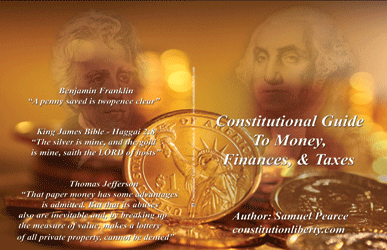| |
|
Test your knowledge about the Constitution by using the online testing. The testing
covers the following book material "Constitutional Guide To Money, Finances, & Taxes".
|
|
Constitutional Guide to Money, Finances, & Taxes: Amazon - Order book
|
| |
 
|
| |
|
Question 1 - Who was the Founding Father that wrote the 1792 Coinage Act?
|
|
|
|
|
Question 2 - Who was the Founding Father that wrote the publication "A Caveat Against Injustice"?
|
|
|
|
|
Question 3 - Definition: What is an impost under the Constitution?
|
|
|
|
|
Question 4 - Who gave the famous "Veto Message of 1832" against the Bank?
|
|
|
|
|
Question 5 - What Article in the Constitution allows gold and silver to be legal tender?
|
|
|
|
|
Question 6 - Who is famous for the following quote: "The power to tax is the power to destroy."?
|
|
|
|
|
Question 7 - Who was the Founding Father that proposed the decimal coinage system?
|
|
|
|
|
Question 8 - What currency was used prior to the formation of the U.S. Constitution?
|
|
|
|
|
Question 9 - What section in the "1792 Coinage Act" made it a death penalty to debase the currency?
|
|
|
|
|
Question 10 - What did the 1792 Coinage Act fulfill in the U.S. Constitution?
|
|
|
|
|
Question 11 - What was one of the objections regarding Andrew Jackson's Bank Veto message?
|
|
|
|
|
Question 12 - Who was the Founding Father that stated: "A penny saved is twopence clear."?
|
|
|
|
|
Question 13 - Who was the Founding Father that wrote the "Defence of the Destruction of Tea"?
|
|
|
|
|
Question 14 - Who was the Founding Father that stated: "No taxes can be devised which are not more or less inconvenient and unpleasant"?
|
|
|
|
|
Question 15 - What case struck down the Income Tax?
|
|
|
|
|
Question 16 - What is the definition of a "Tonnage"?
|
|
|
|
|
Question 17 - What Bills of Credit were implied in the publication "A Caveat Against Injustice"?
|
|
|
|
|
Question 18 - The Spanish American dollar was valued at?
|
|
|
|
|
Question 19 - According to Thomas Jefferson what was a concern of the National Bank?
|
|
|
|
|
Question 20 - What year was the Report on the National Bank written?
|
|
|
| |